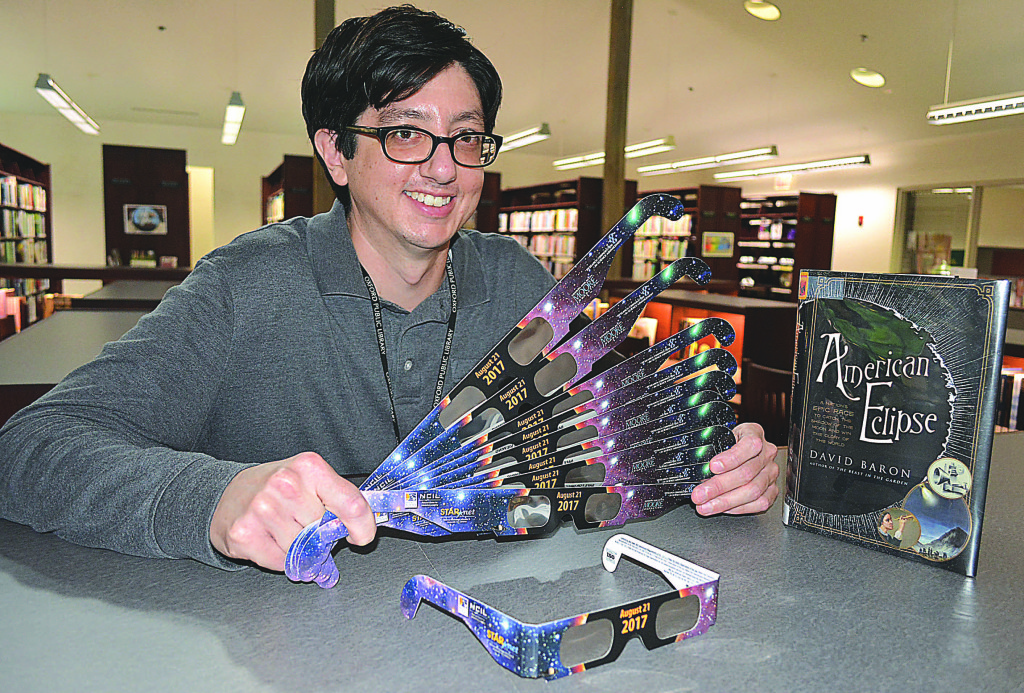
Folks wishing to view the solar eclipse on Monday, Aug. 21 without damaging their vision are encouraged to head over to the Oxford Public Library to get some protection for their peepers.
The library has 1,000 pairs of eclipse-viewing glasses and they’re available to the public, free of charge, while supplies last.
“Hopefully, everybody gets a pair,” said Ricardo Aguirre, the librarian assistant who’s been organizing eclipse-related educational materials, displays and events for the Oxford library.
Thanks to a grant from the Gordon and Betty Moore Foundation to the Space Science Institute, the Oxford library received these special glasses through the Science-Technology Activities and Resources Library Education Network (STAR_Net).
More than two million pairs of eclipse glasses were distributed to more than 7,000 library locations (public libraries, state libraries, bookmobiles, tribal libraries, etc.), which represent nearly half of all libraries in the nation, according to STAR_Net’s website (www.starnetlibraries.org).
Resembling the old 3-D glasses with red-and-blue lenses worn by moviegoers beginning in the 1950s, the eclipse glasses have cardboard frames, but contain special-purpose solar filters that allow the wearer to safely gaze directly at the sun during this unique astronomical event.
These glasses are necessary to view the eclipse because without them, staring directly at the sun can burn the eye’s retinal cells, causing temporary or permanent vision damage depending on how long a person gazes at the bright star.
Sandy Gilmore, head of adult services at the Oxford library, said people “can come in any time” to pick up their glasses, but “we’re encouraging them to come in when we have the open house, so they can get more information and tips on viewing the eclipse.”
The library is hosting an eclipse open house on Wednesday, Aug. 16 from 1-7 p.m. All sorts of interesting and valuable information will be available in the form of displays, diagrams, videos, models and of course, books.
Aguirre has assembled quite the recommended reading list of nonfiction books regarding eclipses and astronomy in general to help spur public interest.
Folks are encouraged to check out “Sun, Moon, Earth: The History of Solar Eclipses, From Omens of Doom to Einstein and Exoplanets” by Tyler N. Nordgren and “American Eclipse: A Nation’s Epic Race to Catch the Shadow of the Moon and Win the Glory of the World” by David Baron.
The library is also recommending a variety of science fiction books related to space and interplanetary travel.
“I tried to get a good cross-section,” Aguirre said.
This open house will be followed by an eclipse viewing party outside the library on Aug. 21 from 12:30 to 3:30 p.m.
“We’re going to have stuff for all ages,” Gilmore said. “We’re going to have some chalk art and some coloring and puzzle sheets while people are waiting . . . We’re hopefully going to have a laptop (computer) with a live feed, so we can keep an eye on things as they’re happening. And we’re going to have food – Sun Chips and lemonade.”
Gilmore is excited about the eclipse because of the “rarity of it.”
“It’s not something that you get to see every year,” she said.
Aguirre can’t wait to experience his very first eclipse. He’s fascinated by how some people are deeply affected by this “surreal experience” and can’t get enough of it.
“There are people who see an eclipse end up becoming these eclipse chasers,” he said. “They spend tens of thousands of dollars flying halfway across the planet to watch two more minutes of an eclipse.”

Leave a Reply